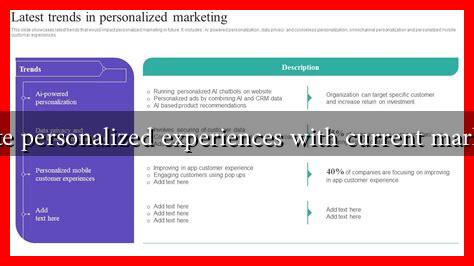-
Table of Contents
How to Create Personalized Experiences with Current Marketing Trends
In today’s fast-paced digital landscape, consumers are inundated with marketing messages. To stand out, brands must create personalized experiences that resonate with their audience. Personalization not only enhances customer satisfaction but also drives engagement and loyalty. This article explores current marketing trends that facilitate personalized experiences and provides actionable insights for businesses looking to implement these strategies.
The Importance of Personalization in Marketing
Personalization in marketing refers to tailoring messages and experiences to individual customers based on their preferences, behaviors, and demographics. According to a study by Epsilon, 80% of consumers are more likely to make a purchase when brands offer personalized experiences. This statistic underscores the significance of personalization in driving sales and fostering customer loyalty.
Current Marketing Trends Supporting Personalization
Several marketing trends are shaping the way brands approach personalization. Here are some key trends to consider:
- Data-Driven Marketing: Leveraging data analytics allows brands to understand customer behavior and preferences better. By analyzing data from various sources, businesses can create targeted campaigns that speak directly to their audience.
- Artificial Intelligence (AI): AI technologies, such as machine learning and natural language processing, enable brands to automate personalization at scale. For instance, AI can analyze customer interactions and suggest products based on past purchases.
- Omnichannel Marketing: Consumers interact with brands across multiple channels. An omnichannel approach ensures a seamless experience, allowing brands to deliver personalized messages regardless of the platform.
- Interactive Content: Engaging content, such as quizzes and polls, can provide insights into customer preferences while offering a personalized experience. This type of content encourages participation and fosters a deeper connection with the brand.
Strategies for Implementing Personalization
To effectively implement personalization, brands should consider the following strategies:
- Segment Your Audience: Divide your audience into segments based on demographics, behavior, and preferences. This allows for more targeted messaging. For example, a clothing retailer might segment customers by age, gender, and purchase history to tailor promotions.
- Utilize Customer Data: Collect and analyze customer data from various touchpoints, such as website interactions, social media engagement, and purchase history. Tools like Google Analytics and CRM systems can help gather valuable insights.
- Personalized Email Campaigns: Email marketing remains a powerful tool for personalization. Use customer data to send tailored messages, product recommendations, and special offers. According to Campaign Monitor, personalized emails have an average open rate of 29% compared to 21% for non-personalized emails.
- Leverage Social Media: Social media platforms offer unique opportunities for personalization. Brands can use targeted ads based on user behavior and interests to reach specific segments effectively.
- Implement Dynamic Content: Use dynamic content on your website to display personalized messages based on user behavior. For instance, an e-commerce site can show different product recommendations based on a visitor’s browsing history.
Case Studies: Brands Excelling in Personalization
Several brands have successfully implemented personalization strategies, setting benchmarks for others to follow:
- Amazon: Amazon’s recommendation engine is a prime example of effective personalization. By analyzing user behavior and purchase history, Amazon suggests products tailored to individual preferences, significantly boosting sales.
- Netflix: Netflix uses sophisticated algorithms to recommend shows and movies based on viewing history. This level of personalization keeps users engaged and encourages them to explore new content.
- Spotify: Spotify’s “Discover Weekly” playlist curates music recommendations based on user listening habits, creating a personalized experience that keeps users coming back for more.
Conclusion
Creating personalized experiences is no longer optional; it is essential for brands looking to thrive in a competitive market. By leveraging current marketing trends such as data-driven strategies, AI, and omnichannel marketing, businesses can tailor their messaging to meet the unique needs of their customers. Implementing effective personalization strategies not only enhances customer satisfaction but also drives engagement and loyalty. As demonstrated by leading brands like Amazon, Netflix, and Spotify, personalization can significantly impact a company’s bottom line. Embrace these trends and strategies to create meaningful connections with your audience and elevate your brand’s marketing efforts.
For more insights on personalization in marketing, visit Forbes.

